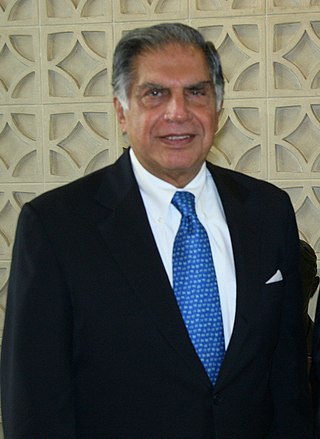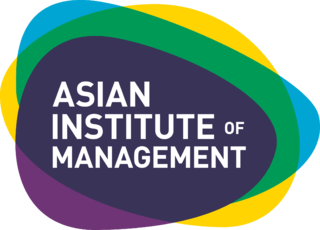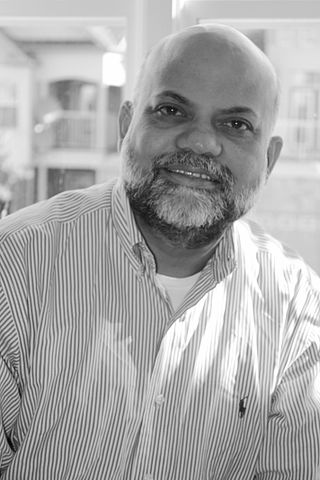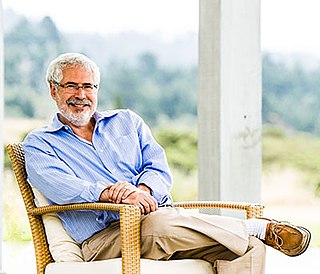Related Research Articles

The MIT Sloan School of Management is the business school of the Massachusetts Institute of Technology, a private university in Cambridge, Massachusetts. MIT Sloan offers bachelor's, master's, and doctoral degree programs, as well as executive education. Its degree programs are among the most selective in the world. MIT Sloan emphasizes innovation in practice and research. Many influential ideas in management and finance originated at the school, including the Black–Scholes model, the Solow–Swan model, the random walk hypothesis, the binomial options pricing model, and the field of system dynamics. The faculty has included numerous Nobel laureates in economics and John Bates Clark Medal winners.

Ratan Naval Tata is an Indian industrialist, philanthropist and former chairman of Tata Sons. He was a chairman of the Tata Group from 1990 to 2012, and interim chairman from October 2016 through February 2017. He continues to head its charitable trusts. In 2008, he received the Padma Vibhushan, the second highest civilian honour in India, after receiving the Padma Bhushan, the third highest civilian honour in 2000.

The Asian Institute of Management (AIM) is an international management school and research institution. It is one of the few business schools in Asia to be internationally accredited with the Association to Advance Collegiate Schools of Business (AACSB). It was established in partnership with Harvard Business School and uses the Harvard Business School case study teaching methodology. Prof Stephen H. Fuller of the Harvard Business School was its first president, to be succeeded by another professor from Harvard. It was described by Asiaweek magazine as the best in the Asia-Pacific region in terms of executive education.

Iqbal Z. Quadir is an entrepreneur and promoter of the role of entrepreneurship and innovations in creating prosperity in low-income countries. He has taught at Harvard Kennedy School and at Massachusetts Institute of Technology. He is the brother of Kamal Quadir.

The Isenberg School of Management is the business school and also the second largest school at the University of Massachusetts Amherst, the flagship campus for the University of Massachusetts system. The Isenberg School is accredited by the AACSB International and ACPHA.

Steve Blank is an American entrepreneur, educator, author and speaker based in Pescadero, California.

Linda Rottenberg is an American businesswoman and author. She is the author of Crazy Is a Compliment: The Power of Zigging When Everyone Else Zags. She is the CEO and Co-founder of Endeavor, a non-profit organization that encourages the power of entrepreneurship.

Karen Gordon Mills is an American businessperson and former government official who served as the 23rd Administrator of the U.S. Small Business Administration (SBA). She was nominated by President-elect Barack Obama on December 19, 2008, confirmed unanimously by the Senate on April 2, 2009, and sworn in on April 6, 2009. During her tenure, her office was elevated to the rank of Cabinet-level officer, expanding her power on policy decisions and granting her inclusion in the President's cabinet meetings. On February 11, 2013, she announced her resignation as Administrator and left the post on September 1, 2013.

Indian Institute of Management Rohtak is a public business school located in Rohtak, Haryana a part of the National Capital Region (NCR) of India.
Navi Radjou is an Indian born scholar and an innovation and leadership advisor based in Silicon Valley. He is a Fellow of Judge Business School at the University of Cambridge and has spoken and written widely on the theme of frugal innovation.
The Fletcher School of Law and Diplomacy is the graduate school of international affairs of Tufts University, in Medford, Massachusetts. Fletcher is one of America's oldest graduate schools of international relations and is well-ranked in its masters and doctoral programs. As of 2017, the student body numbered around 230, of whom 36 percent were international students from 70 countries, and around a quarter were U.S. minorities. The school's alumni network numbers over 9,500 in 160 countries, and includes foreign heads of state, ambassadors, diplomats, foreign ministers, high-ranking military officers, heads of nonprofit organizations, and corporate executives. It is consistently ranked as one of the top graduate schools for international relations in the world.
Tarun Khanna is an Indian-born American academic, author, and an economic strategist. He is currently the Jorge Paulo Lemann professor at Harvard Business School; where he is a member of the strategy group, and the director of Harvard University’s South Asia initiative since 2010.

Deepak Ohri is an author, entrepreneur, business leader, public speaker, lecturer, and mentor.

John Curtis Perry also known as John Perry is an East Asian and Oceanic studies professor and historian. He is the Henry Willard Denison Professor Emeritus of History at the Fletcher School of Law and Diplomacy, Tufts University. He was also the director of that school's Maritime Studies program and founding president of the Institute for Global Maritime Studies, until his retirement in 2014.

Alan Michael Wachman was a scholar of East Asian politics and international relations, specializing in cross-strait relations and Sino-U.S. relations. He was a professor of international politics at The Fletcher School of Law and Diplomacy, Tufts University. Previously he had been the co-director of the Johns Hopkins University-Nanjing University Center for Chinese and American Studies in the PRC, and the president of China Institute in America.
Rebeca Minguela is a Spanish entrepreneur and startup advisor. She was the founder and CEO of Blink Booking, now Blink by Groupon, an award-winning mobile app to book hotels last minute in Europe. When Blink was acquired by Groupon in September 2013, she joined Groupon.
William R. Kerr is the Dimitri V. D'Arbeloff – MBA Class of 1955 Professor of Business Administration professor at Harvard Business School, where he is a co-director of Harvard's Managing the Future of Work project and faculty chair of the Launching New Ventures program for executive education.

On 8 November 2016, the Government of India announced the demonetisation of all ₹500 and ₹1,000 banknotes of the Mahatma Gandhi Series. It also announced the issuance of new ₹500 and ₹2,000 banknotes in exchange for the demonetised banknotes. Prime Minister Narendra Modi claimed that the action would curtail the shadow economy, increase cashless transactions and reduce the use of illicit and counterfeit cash to fund illegal activity and terrorism.
References
- 1 2 Tanikawanov, Miki (November 19, 2012). "Executive Education, but Not for Business". The New York Times. Archived from the original on November 28, 2012. Retrieved June 20, 2016.
- 1 2 3 4 Bradshaw, Della (November 19, 2012). "Breaking down the boundaries of business and law; Commercial law has traditionally been about setting up companies rather than making business decisions, something that schools are looking to change, writes Della Bradshaw". Financial Times. London, England. p. 3 (Section: FT Report - Innovative Law Schools). Archived from the original on 2013-02-02. Retrieved Mar 6, 2014.
- 1 2 3 4 Perlroth, Nicole; Goel, Vindu (December 5, 2013). "Internet Firms Step Up Efforts to Stop Spying". The New York Times. Retrieved June 20, 2016.
- 1 2 Yu, Hui-yong; Urban, Rob (February 1, 2012). "China Home Prices May Fall as Much as 15%, GreenOak's Kalsi Says". Bloomberg News . Archived from the original on July 9, 2015. Retrieved October 2, 2016.
- 1 2 Wolman, David (September 9, 2013). "The Cost of Cash, for the Rich and the Poor". The New Yorker . Archived from the original on October 16, 2016. Retrieved October 16, 2016.
- 1 2 Stone, Zack. "Does America Suck At Globalization?". Fast Company . Archived from the original on March 4, 2016. Retrieved October 2, 2016.
- 1 2 Guerrero, Antonio (May 2011). "Pause For Thought". Global Finance . 25 (5): 46–48.
- 1 2 Skenazy, Lenore (October 10, 2012). "Born on the Lower East Side". The Jewish Daily Forward. Archived from the original on October 2, 2016. Retrieved October 2, 2016.
- ↑ "India's Botched War on Cash". Harvard Business Review. Retrieved 2017-03-15.
- ↑ "Early Lessons from India's Demonetization Experiment". Harvard Business Review. Retrieved 2017-03-15.
- ↑ "Harvard talks back to hard work: Professor finds Modi's election victory like a Bollywood blockbuster". The Economic Times. Retrieved 2017-03-17.
- ↑ "One Year After India Killed Off Cash, Here's What Other Countries Should Learn from It". Harvard Business Review. Retrieved 2017-09-02.
- 1 2 3 4 5 6 7 8 9 "Dr. Bhaskar Chakravorti". Medford, Massachusetts: The Fletcher School of Law and Diplomacy. Archived from the original on December 26, 2013. Retrieved Jan 20, 2014.
- ↑ Xin, Chen (September 12, 2012). "Experts say it's now time to re-tool the 'world's factory'". China Daily . Tianjin, China. Archived from the original on September 15, 2012. Retrieved October 2, 2016.
- ↑ Chakravorti, Bhaskar (1987). Information, incentives and rational expectations (Thesis). OCLC 18487325.
- ↑ "TAS Legacy". India: Tata Group. Archived from the original on 2012-12-15. Retrieved June 21, 2016.
- 1 2 3 Korn, Melissa (January 27, 2012). "Teaching Global Business". The Wall Street Journal . New York. Archived from the original on May 5, 2016. Retrieved October 2, 2016.
- ↑ "Don't laugh at gilded butterflies". The Economist . London. April 22, 2004. Archived from the original on March 25, 2015. Retrieved June 20, 2016.
- ↑ "Legatum Center for Development & Entrepreneurship" (PDF). Cambridge, MA: Massachusetts Institute of Technology. Archived from the original (PDF) on May 7, 2016. Retrieved June 21, 2016.
- ↑ Hill, Andrew (April 23, 2012). "Citizenship matters but adaptability is key". Financial Times. Retrieved Feb 1, 2014.
- 1 2 Singh, Namrata (Sep 8, 2011). "CEO succession: How to get the right fit". The Times of India . Archived from the original on October 2, 2016. Retrieved October 2, 2016.
- ↑ Tseng, Nin-Hai (February 7, 2012). "Why China's housing market will slow, not collapse". Fortune Magazine . Archived from the original on February 5, 2017. Retrieved October 2, 2016.
- ↑ "About (IBGC)". Medford, Massachusetts: The Fletcher School of Law and Diplomacy. Archived from the original on December 23, 2013. Retrieved Feb 1, 2014.
- ↑ "Master of International Business". Medford, Massachusetts: The Fletcher School of Law and Diplomacy. Archived from the original on 2014-01-23. Retrieved Feb 1, 2014.
- ↑ Chakravorti, Bhaskar (Jan 27, 2012). "Teaching Global Business". Wall Street Journal (Online) (Interview). Interviewed by Melissa Korn. Retrieved Feb 1, 2014.
- ↑ Hoare, Stephen (April 18, 2011). "Overseas learning entices those bitten by the travel bug; Many young Emiratis are combining study with their yearning to sample life overseas, says Stephen Hoare". The Times. London. p. 12,13.
- ↑ Mallikarjun, Y. (August 31, 2011). "US downturn will not affect India". The Hindu . Archived from the original on 2017-02-05. Retrieved October 2, 2016.
- 1 2 Tanikawa, Miki (Nov 19, 2012). "Executive courses turn to niche areas: Working professionals return to classrooms with more than business aims" (PDF). International Herald Tribune. Paris. p. 14. Archived from the original (PDF) on February 2, 2014. Retrieved Jan 21, 2014.
- ↑ Anderson, Linda (March 26, 2007). "Degree for a complex world FLETCHER SCHOOL: The Master in International Business combines academic with practical, says Linda Anderson". Financial Times. p. 12. Retrieved Jan 20, 2014.
- ↑ Cooper, Jay (March 17, 2008). "Sovereign wealth fund hires no cinch; Potential treasure trove of business awaits, but getting to it won't be a walk in the park". Pensions and Investments. p. 6. Retrieved Jan 21, 2014.
- ↑ Schiller, Ben (Jan 17, 2011). "The inexorable rise of the MBA politicians: Politics attracts plenty of management graduates but opinions are divided on their effectiveness in office, writes Ben Schiller". Financial Times. p. 12. Retrieved Feb 1, 2014.
- ↑ "World Economic Forum: Bhaskar Chakravorti". Cologny, Switzerland: World Economic Forum. 2016. Archived from the original on June 22, 2016. Retrieved June 21, 2016.
- ↑ "Leaving dead presidents in peace - Abolishing notes and coins would bring huge economic benefits". The Economist. London. Sep 20, 2014. Archived from the original on April 9, 2016. Retrieved June 20, 2016.